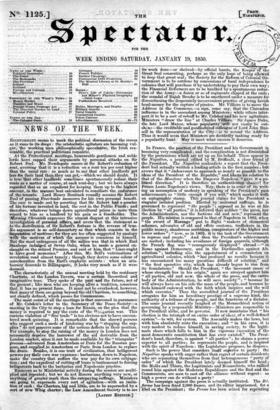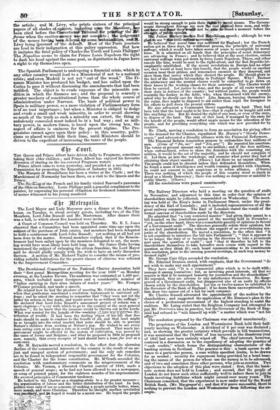In France, the position of the President and his Government
is becoming very complicated ; and the complication is not diminished by the pretensions which are set up on his behalf. These appear in the NapoMon, a journal edited by M. Briffault, a close friend of the President " i" he Napoleon contradicts a report that the Presi- dent had actually written a leading article in the first number ; but avows that it " endeavours to approach as nearly as possible to the ideas of the President of the Republic," and likens its relation to that of the Moniteur when the Emperor Napoleon " gave it a po- litical direction." It is therefore an authenticited enaime! for Prince Louis Napoleon's views. Nay, there is in some of its writ- ing an assumption of modesty in speaking of the President's past achievements as " little enough if you will," which marks it with an autographic stamp. This journal claims for -the President a singular isolated position. Electecrhy universal suffrage, he is presumed to represent " the people "; opposed as he was at his election by " all parties," it is inferred that neither " the press, nor the Administration, nor the factions old and new," represent the people. His mission is compared to that of Napoleon in 1802, when. " the sword of Marengo " put to flight " makers of chimerical schemes, advocates of old and effete customs, traffickers in the public money, slanderous scribblers, conspirators of the higher and lower orders"; "now, as in 1802, it is the task of the Government to repress and create " And then the President's achievements are recited ; including his avoidance of foreign quarrels, although the French flag, was " courageously displayed" abroad—" at Rome against Democracy, and in the Dardanelles against Ab- solutism • including also the appointment of a commission on agricultural colonies, which " has produced no results because it has encountered too many questions difficult of solution," and " the first operative oiV:, which has already begun to rise from its foundations." Should the President, " the ' incessant =vie' of whose strength lies in his origin," again see arrayed against biiu " all parties, old and new, the whole of the press, and the entire body of the Administration, he will save society." ; " because ho will always have on his side the mass of the people, and because he feels himself endowed with the faith which inspires and the will which executes." Thus the accredited journal of the President arrogates for him an hereditary prestige of a supreme kind, the authority of a tribune of the people, and the functions of a dictator. The same journal recently laughed at the Monarchical notion of governing by .a-tesponsible Ministry—Ministers are responsible to the President alone, and he governs. It now maintains that " his election is the triumph of an entire order of ideas, of a well-defined system"—to wit, his system. The Assembly makes the laws, but with him absolutely rests the execution; and " in his eyes, it is very modest to reduce himself, in saving society, to the legiti- Mate share which falls to him in the vigorous execution of the most democratic constitution that has ever existed." The Presi- dent's hand, therefore, is against " all parties." ; he claims a power superior to all parties ; he represents the people, and is inspired with the spirit of Napoleon : the Legislature proposes, he disposes.
i - Such is the power that considers itself superior to party : the Napoleon speaks with anger rather than regret of certain dissidents who are separating themselves from that heterogeneous " party of order" of which the President lately deemed himself the head ; the Moles and Thiers, the Legitimists and Monarchists, who rallied round him against the Moderate Republicans and the Red and the Communists, are seen to cast off the alliance without regret : so • h a power can do without a party!
The campaign against the press is actually instituted. The Re- forme has been fined 2,000 francs, and its editor imprisoned, for a libel on the President ; the Freese has been seized for reprinting the article ; and M. Levy, who pprrinmts sixteen of the principal papers of all shades olopsawn,dinto. the Ilfaniteur, has been cited before the,Tribi .111115r priding- the- forme when the caution-money was not com*te k the lodgement of the money having halaadelaved. by some, liehDleatiES, =AIL Levy being ignorant of" the default. Most of the Paris journals areloud in their indignation at this paltry oppression. But how it imitates the fatal policy of Charles the Tenth and Louis Philippe! The Napoleon seems to claim for Prince Louis Napoleon the right to dash his head against the same post, as dignitaries m Japan have a right to rip themselves open.



























 Previous page
Previous page